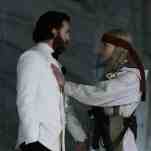Multiplayer matchmaking might be doomed to suck
Hell Is Other People
This week, Ryan Smith weighed in on Evolve, the new multiplayer game that has a team of four players hunting down a lone but powerful monster player. He thought it was a gutsy and winning formula—but only when you’re playing as the monster, or if you’ve managed to get a group of communicative and cooperative players together. That latter issue has been plaguing online multiplayer games for years, and there’s no real solution in sight, a reality ItsTheShadsy lamented in the comments:
So many multiplayer games seem to be designed in an idealized vacuum, in the sense that they work extremely well when everyone plays in the style (and in the numbers) that the developers are anticipating. For Evolve, there’s an assumption that players will communicate and work together. That doesn’t happen in practice a majority of the time when playing games online, so like Ryan suggested, it falls apart.
The question I’ve been struggling with is: Is that a fault of the game itself or the community that plays it? I hate to rag on a game for ambitious design, but it’s also becoming clear that games built around matchmade multiplayer have to lower their expectations about player involvement. In an ideal situation with experienced, communicative players—maybe at a LAN party or tournament—Evolve might work really well. But that will never ever be the reality for almost everyone who plays this game. That should be anticipated at this point. Plenty of games are now building in features that work around these handicaps, like the auto-spotting in recent Battlefield games and the vocal chatter in the Halo 5 beta that calls out enemy positions, strategies, and so forth. Maybe it’s a little disheartening to ask for features that make up for player malaise, but that’s the state of multiplayer-focused games right now.
Carlton Hungus pointed to a recent game that possibly went too far trying to avoid bad matchmaking:
It’s similar to the problem with Destiny’s raids. They don’t have matchmaking, and you can only go with people you know. (Although plenty of third-party websites allow you to group up.) Bungie says this is a strategic decision, that they designed the raids to require cooperation, and they’d be unbeatable if everyone just went in lone-wolf/not communicating.
I’d rather see games try and fail, such as here, than either wall it off like Destiny, or worse, dumb it down too much. There’s such beauty and fantastic play when a team does work together, I think it outweighs the lows that come with the possibility of poor teammates. Plus there’s never going to be a way to get rid of trolls entirely, but as more and more co-op games are released, societal norms will eventually develop on being a good teammate.
Venerable Monk ran down what it might take to get randomly matched sessions working better:
My first thought would be to find some way to track levels of skill and cooperation. Assign everyone an invisible rating in such categories, and group folks with similar attributes in the same matchmaking rooms. This would be complicated by the fact that each team member has a distinct role, so the skill measurements would have to be tailored to the class you’re playing. Then, you apply the same logic to the creature player, with some fancy formula for figuring out how to equate a specific beast skill level to an aggregate level for the hunter team. It’s much more complicated than comparing kill-to-death ratios in a typical shooter.
Still, this would only get you a bit closer to something that resembles balance. There’s really no accounting for the inevitable quitters and “lone wolf” types. It sounds like the developers are content to let the creature players regulate such anti-collective behavior themselves. If the creature is always strong enough to kill a single hunter, then you’d think that repeated instant deaths would quickly teach such “rugged individualists” to stick with the group.







































